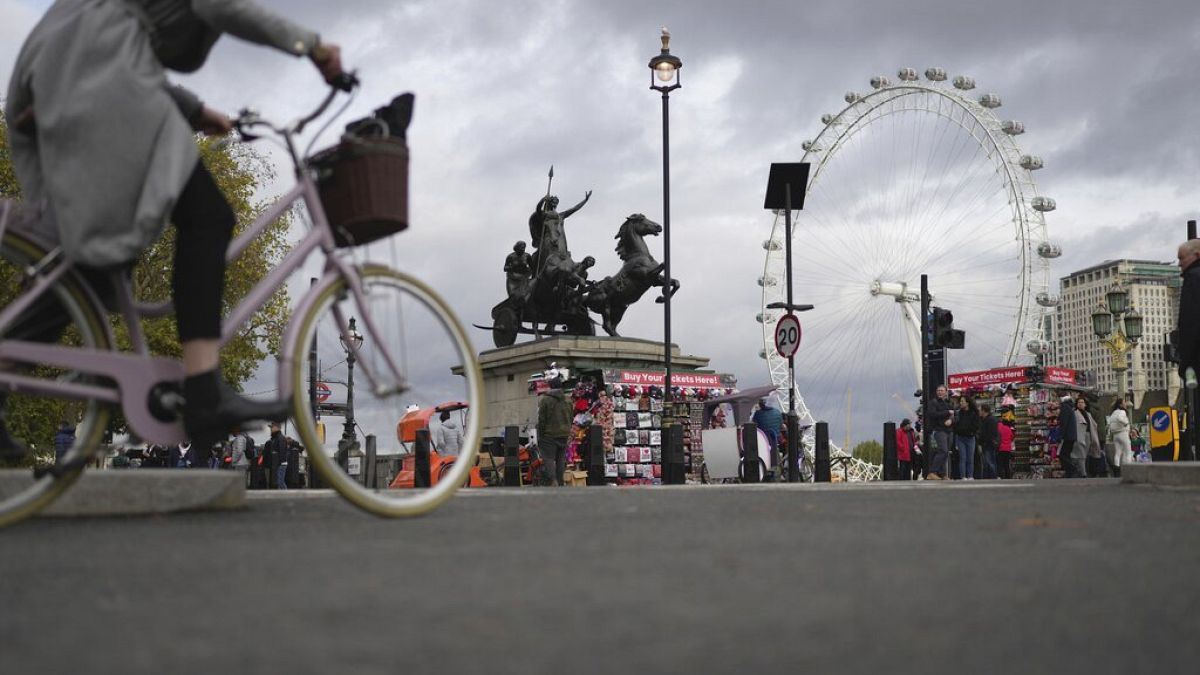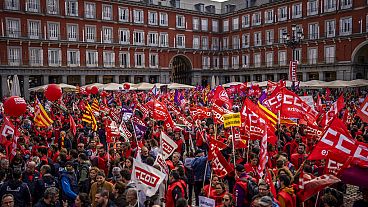Schemes such as the Married Couple's Allowance and pension tax relief could help UK taxpayers save money.
While taxes may be an inevitable, if somewhat tedious part of our lives, nobody wants to be paying more than necessary. Although the UK has relatively lower tax than several European countries, with the cost of living and interest rates in the UK still uncomfortably high, people in the UK are finding it harder to save money.
According to the Resolution Foundation, more than 11 million Britons have less than £1000 (€1175) put away in savings for a "rainy day" as the cost of living continues to rise and ongoing geopolitical crises such as the Russia-Ukraine war and the Israel-Hamas conflict increase costs and energy prices. That could be a problem when it comes to needing extra money for an unexpected personal living crisis or if you are seeking to raise the money to put aside for retirement.
As such, saving every extra penny possible on tax has become more important than ever now. Here are some suggestions on ways of saving a little more on taxes in the UK.
Claim back work and travel expenses
You could be claiming back work and travel expenses if your place of work is temporary, or is primarily from home, with required travel to clients. If this is the case, you could get tax relief for the vehicles you use for work, with bicycles, vans, cars and motorcycles having eligibility status. If suitable, tax relief can be claimed for the current year, as well as the four previous tax years.
The exact amount you could claim back depends on whether you personally lease or own your own vehicle or whether it is an employer-provided one.
You will need to keep a clear record of dates and mileage rates for journeys needs for all vehicles used, making deductions for any mileage allowance provided by your employer.
Separate costs for fuel, electricity, repairs, Ministry of Transport (MOT) tests and vehicle tax for privately owned vehicles cannot be claimed. However, fuel and electricity costs can be claimed for company cars, as long as detailed records are kept. If your employer pays some of the costs, you will be able to claim the difference.
Currently, the approved mileage rates for cars and vans are 45p for the first 10,000 business miles in the tax year, and 25p for each business mile over 10,000 in the tax year. For motorcycles, it is a flat 24p for both categories, with bicycles also having a flat 20p mileage rate for both the above.
You may also be able to claim back expenses on some types of work clothing necessary for certain sectors, such as safety wear and labelled uniforms. In some cases, this includes laundry and repair expenses.
Some eligible industries include airlines, agriculture, aluminimum, banks and building societies, constructional engineering, fire services, heating, leather, precious metals and more.
Some professional membership and union costs, as well as subscription expenses to required trade journals can also be claimed back. These include the British Academy of Management and the Administrative Law Bar Association. This also includes any training and upskilling courses directly related to your current role as well as qualifications needed to stay members of certain professional bodies.
Marriage could benefit your tax bill too
Married couples could take advantage of the somewhat little-known Marriage Allowance, which is free and could also apply if you're in a civil partnership. Under this scheme, a wife, husband or civil partner can transfer up to £1,260 (€1,474) of their own personal allowance to their partner. This could potentially cut your tax bill by up to £252 (€295) in a tax year.
However, this is only possible provided that the transferring partner earns less than the other partner, with an income less than, or equal to, the personal allowance, which is currently £12,570 (€14,706). The receiving partner should also be a basic rate taxpayer, with an income of between £12,571 and £50,270 €58,813). If you live in Scotland, this is reduced to £43,662 (€51,082).
This can be backdated to include any Marriage Allowance that you might have been eligible for since 5 April 2019 and can also apply even if a partner has since died.
Another way married couples can save on tax is by sharing the dividends gained on shares owned between the two of them. This could go a long way in staying under the £1,000 tax-free dividend allowance, as dividends above this limit have an 8.75% tax for basic rate taxpayers and a 33.75% tax for higher rate payers.
Pensioners don’t have to fall behind
There are a number of support and relief measures for older tax payers, such as pension tax relief. This could give basic rate taxpayers 20% relief, with higher-rate taxpayers getting 40% and additional-rate payers up to 45%.
However, this depends on the kind of pension scheme to which you are currently subscribed. People who opt for salary sacrifice as well as trust-based workplace schemes are most likely to get their full tax benefits.
For the latter, though, it may be useful to keep in mind that if a company goes out of business, the ultimate pension amount received may be less than previously anticipated. This is due to the scheme's operating expenses also being paid out of the members' pension amounts, instead of the company who may not have the solvency required anymore.
On the other hand, with group self-invested personal pensions (SIPPS), group personal pensions and stakeholder pensions, there is a flat tax relief of 20% no matter what individuals earn. This means that people who qualify as higher or additional tax payers, may have to reclaim the extra relief.
Another way pensioners can save on tax is through cutting their inheritance tax bill, by giving money or gifts away while they are still alive. This includes a tax-free gift amount of £3,000 (€3,510) per tax year, which is your annual exemption. You can also give away several gifts of £250 (€292) to people who have not received any of your annual exemption each tax year.
Gifts made to spouses or civil partners are usually tax-free, as well as some gifts to other people more than seven years before your death. Parents can also give up to £5,000 €5,850) tax free to children for their weddings, as well as providing them with money for training and education tax-free up until they reach the age of 18.
People who keep working after the state retirement age, presently 66 for both men and women, do not need to pay National Insurance contributions.
Tax support on childcare and for people on low incomes
People with low incomes, parents with children under the age of 18, or those taking care of disabled people, could take advantage of tax credits such as child tax credit and working tax credit. However, most of these will be transitioned to Universal Credit by the end of 2024.
Working tax credit is a support measure to help people on lower incomes with daily expenses. It can only be claimed if someone already gets child tax credit and has already applied for working tax credit in the last year. If not, they need to claim Universal Credit.
Single people or couples without children need to be working a minimum of 30 hours, as well as be 25 years old or older. However, disabled people, as well as people with children, could be eligible working a minimum of 16 hours, as long as they are 16 or older.
Couples, whether married, living together or in civil partnerships need to apply together.
Basic payment for working tax credits for the 2023/2024 tax year is £2,280 (€2,667), but can go up till £3,685 (€4311) depending on whether you are applying as a single person or a couple, the number of your working hours and the extent of disabilities, if any.
Child tax credit can be claimed by people who are the primary caregivers for a child or other qualifying young person. You have to already be claiming working tax credit and have applied for child tax credit in the past year, otherwise, you’ll have to claim Universal Credit.
For the 2023/2024 tax year, child tax credit payments can range from about £545 (€638) to £3,905 (€4569), depending on the number of children you have and their disabilities, if any. Child tax credit payments usually stop on 1 September of the September following the child's 16th birthday.
You can also claim back 25% of childcare, under the tax-free childcare scheme, which can be started with an online account. This can then be used to organise payments to your childcare provider. To be eligible for this scheme, you need to be earning less than £100,000 (€116,994) and have a child under the age of 11.
Be savvier about your savings and investments
As an additional incentive to save more, up to £1,000 of interest is tax free for basic rate taxpayers in the 2023/2024 tax year. However, this falls to £500 (€585) for higher rate payers, with additional rate payers not having a savings allowance.
That means that only interest that exceeds this limit is taxable, which taxpayers will have to file themselves via self-assessment, unless it is deducted through PAYE.
Similarly, for the 2023/2024 tax year, taxpayers can pay up to £20,000 (€23,399) into individual savings accounts (ISAs), which will also be tax free. This can be divided between a variety of ISA options such as a stocks and shares ISA, a cash ISA or a combination of both.
There is also a tax-free dividend allowance of £1,000 for the 2023/202 tax year, which will be cut to £500 for the 2024/2025 tax year.
Taxpayers who earn income from the sale of assets such as antiques, second homes, art and shares are also entitled to claim tax free capital gains of up to £6,000 (€7,020) in the 2023/2024 tax year.
This can rise to £12,000 (€14,040) for civil partners and married couples, who own the assets together, as they can both claim their respective shares of tax-free income separately. However, capital gain taxes will not apply on sales of shares in ISA gains.
They will also not apply on any transfer of eligible assets to a civil partner or spouse, which may be a good idea, if they are in a lower tax bracket than yours. It may make more financial sense to try to convert assets into shares or property, in order to take advantage of this.
Do your due diligence
This includes small things like making sure you check your tax code every time your job profile changes, or you change employers, to make sure it's correct and you're not paying more than necessary.
This also includes reclaiming any extra tax paid, especially in years that your income may have fallen.
Keeping track of tax filing deadlines in the UK could also help you avoid an unpleasant surprise in the form of penalties for late payments. Currently, the UK deadline for paper filing is 31 October following the end of the tax year, which is 5 April. If you file online, this deadline is extended to 31 January of the following year.
This information does not constitute financial advice, always do your own research on top to ensure it's right for your specific circumstances. Also remember, we are a journalistic website and aim to provide the best guides, tips and advice from experts. If you rely on the information on this page then you do so entirely at your own risk.



